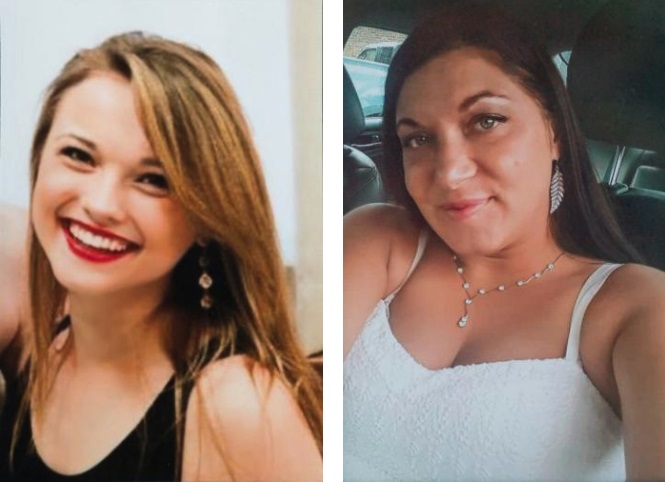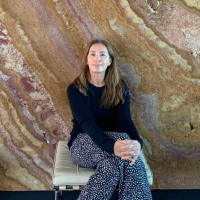
Left: Katie Stubblefield, transplant recipient, in 2013.
Right: Adrea Schneider, the donor, in 2017.
The story of Katie Stubblefield’s face transplant stunned me and completely invaded my thoughts ever since I read about it last week.
There is so much there of what many of us struggle with: suicide, our relationship with our appearance, our search for what gives life meaning.
A beautiful, smiley 18-year-old Katie attempted suicide, which resulted in a severe gunshot injury to her face.
The now-disfigured 21-year-old Katie exclaims that life is precious and how grateful she is to have a second chance at it.
“Appearance is the most public part of the self. It is our sacrament, the visible self that the world assumes to be a mirror of the invisible, inner self,” wrote Nancy Etcoff in her book, Survival of the Prettiest: The Science of Beauty.
Yet in our world, faces have become a blank canvas to be manipulated with cosmetic surgery, injections, and intricate makeup techniques learned on YouTube.
It’s as if we are no longer interested in expressing our true nature, but rather try to suppress the unexplored inner self, choosing instead to wear a mask to appeal to the ever-demanding eyes of social media.
In our selfie-obsessed culture, young women are increasingly competing on their superficial attributes. Yet it is our sense of self as separate from others that is at the root of our suffering.
In our attachment to the world of form—of physical objects and thoughts that cluster around them—we have reduced our existence exclusively to the material realm, completely unaware of the complexity of the world we live in.
Unfortunately, the awareness of this greater reality is not taught in school. A mechanistic interpretation of the world teaches us to see people as machines, not as multidimensional beings—as bodies, but not as spirits, denying who and what we actually are.
Many of my clients struggle to allow the possibility of a spiritual dimension into their lives. To make room for a more expanded awareness requires willingness to discard many of the notions we have accepted as irrefutable facts.
We are not meant to be satisfied with possessions, or fame, or surface appearances.
In order to thrive we need meaning in our lives that extends beyond the material. The connection to it already exists in each one of us, but we have lived denying it for so long that we have become completely unaware of it.
We are emotionally disconnected from each other, from ourselves, from nature, from any sense of transcendent reality. Our predicament is the consistent, rolling trauma of living in a world disconnected from love. We are not just depressed about specific incidents, and we are not just depressed as individuals. We are depressed collectively.
This collective depression is so huge, so all-pervasive that few even recognize how strange it is. Yet, globally close to 800,000 people die due to suicide every year, which is about one person every 40 seconds, according to the World Health Organisation.
Nearly 45,000 lives were lost to suicide in 2016 alone and more than half of people who died by suicide did not have a known mental health condition.
Katie’s mother says that they do not believe for one moment that Katie wanted to die. “She hit a low where she definitely thought about it and in a moment a decision was made.”
Many of us have encountered those moments. Those moments when the pressure to be something or somewhere other than who or where we actually are becomes unbearable. Moments when the pain of seeming inadequacy steeped in comparison to some unattainable made-up standard becomes too painful, and we have no alternative way of self-measure and self-acceptance to fall back on.
I do not know all the details of Katie’s story. But, according to Katie’s mom, she was a perfectionist, putting enormous pressure on herself.
The trap of perfectionism is something I know and understand intimately. Dazzled by a perfect looking surface, we project on it all the trappings of enviable success. What hides beneath is the sense that we are lost, directionless, hollow. No matter how much outward validation we get, it never seems enough.
We grow up thinking there is something wrong with us, with an education system and medical industry that try to “correct” us. We spend the rest of our lives trying to prove to ourselves and to others that we are enough.
The suffering that drives us and colors our world is rarely rooted in our actual reality. It is the stories we tell ourselves about our condition. Most people who attempt suicide are physically healthy and in full possession of all their physical faculties. It is their psychic pain that is so great that it overwhelms their will to live.
We have a complicated relationship with pain.
We shun it. We are afraid of it. We do not understand it. Psychic pain stems from the seeming sense of disconnect, the separation from Source and from each other, the forgetting that we are all connected and are part of all that is.
Most of us tend to run away from any discomfort of unpleasant thoughts. Our culture encourages us to avoid the agony of difficult feelings, loss, and defeat at all costs. We are now medicated from childhood, eliminating any possibility to develop healthy coping mechanisms to deal with hardships of life.
Yet some form of misfortune invariably enters our lives. A sense of loss strips us from the shallow ego identities we mistaken for our self. In those moments, life forces us to learn to rely on our inner resources.
What I have learned through my own struggles is that when we are put in the position of vulnerability and require help, a completely new vision of the world opens up for us. From the world of separation, perfectionism, judgement, and competition, we discover humanity, compassion, and love in the most unexpected places.
When we break down the walls that separate us from others and all that is, we encounter an alternative way to live.
According to the study of the brains of meditators, described by Martha Beck in her book, Steering by Starlight, whenever they achieved the sensation of unbounded bliss, the right side of their brain became more active and an area at the back, which allows us to feel the difference between ourselves and our environment, lit up.
The study concluded that our ability to experience mystical states was due to our ability to drop our body boundaries to feel merged with another being (as during sex) and that bliss was experienced as the ecstatic oneness with the universe.
This may be the reason why meditators showed fewer signs of psychological dysfunction than people who were wholly invested in the physical world.
The ability to mitigate the material world with the spiritual takes the pressure off of the material one. Speaking from experience, as I meditate, cultivate sense of gratitude for all that I already have, focus on my passions, spend time in nature, commune with largeness of life, the more the unrelenting stream of worries on the material level does recede, even if just temporarily.
Pain and suffering are part of our human condition.
We need to learn how to transcend them and allow them to become a gateway, a portal to greater understanding of the complexity of our experience.
When we are able to shift our identity from ego to soul, from surface to within, we become humbled by the realization of what a small and insignificant part of the universe we are. Then, when we navigate life in humility, we get access to awe, majesty, and the immense beauty of ordinary moments.
The magnificence of drinking a glass of cool water on a hot day, the pleasure of a hot bath in winter, the relief of stretching our legs after a long trip, the joy of a nice meal shared with loved ones.
Ordinariness—which our culture tends to see as disappointing—is considered the highest manifestation of enlightenment in many other belief systems.
We need to switch our relationship with our lives from perpetual dissatisfaction and rejection of what is and focus on gratitude for our multiple ordinary blessings. The variety of ordinary life is infinite and precious.
What I find remarkable in Katie’s story is that the aftermath of her suicide attempt has obliterated her superficial connection to the world.
Katie’s accident has forced her to transcend everything that has to do with reliance on the surface. When she had trouble breathing, seeing, eating, speaking, it made her appreciate the precious gift of our functioning bodies.
As is often the case, something terrible gives birth to something unexpectedly wonderful.
Katie says that she is overwhelmed by all the love and attention she has received, and by the desire of others to help her. Noticing this made her realize how precious and beautiful life is. Katie hopes to use her historic surgery to raise awareness about the lasting harms of suicide and the precious value of life.
Katie’s case is extreme but it demonstrates the complexity and multi-dimensionality of the existence available to us.
Every instant of time is a possibility to re-write our story.
Each moment is a new beginning.
No matter how many years have been stolen from us by our ignorance and unawareness, by cruel fate or by the acts of others, we have a clean slate before us: this new instant.











Read 11 comments and reply